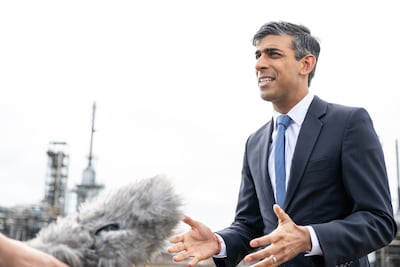Cast your mind back three years. The UK's prime minister at the time, Boris Johnson, told his annual party conference that offshore wind farms would generate enough electricity to power every home in the country by 2030.
Mr Johnson announced plans to upgrade ports and factories for building wind turbines to help the UK “build back greener”.
Some 2,000 jobs in construction would be created, supporting 60,000 more. Britain, Mr Johnson declared, would become “the world leader in clean wind energy”.
“Your kettle, your washing machine, your cooker, your heating, your plug-in electric vehicle – the whole lot of them will get their juice cleanly and without guilt from the breezes that blow around these islands,” Mr Johnson proudly announced.
In a typical nod to Britain’s starry past, he promised a “green Industrial Revolution”, with this being the first phase. Further announcements would follow, to “accelerate our progress towards net zero emissions by 2050".
Last week, ministers announced a halt by the UK to new offshore wind farm building after no bids were received in the latest round of the government’s auction. Industry insiders said “disastrous” handling by the government had created a future shortfall in renewable energy.
Meanwhile, the UK’s largest wind farm developer ruled out building new onshore wind farms in England and Wales. Alistair Phillips-Davies, chief executive of SSE, said his company was “unlikely to build a single wind farm” in England or Wales. There were too many protests, making England and Wales “particularly awkward places to try to do business”. He also warned that future onshore projects in Scotland were likely to be limited.
Then, it was reported that Prime Minister Rishi Sunak would not be attending next week’s annual UN General Assembly of world leaders in New York.
The UN Secretary General, António Guterres, is holding a “climate ambition summit”, a day after the gathering. Mr Guterres decreed that only countries that could show they have ambitious policies to reduce their emissions in line with the goals of the Paris Agreement would be allowed to participate in the bolted-on climate section.
Letters were sent to governments by the UN last month emphasising that merely having net zero targets would not be sufficient to guarantee participation. Evidence of clear and ambitious policy measures and commitments was required. Without this, they could attend but not participate. Rather than risk embarrassment at being frozen out, Mr Sunak decided not to go to New York at all.
That’s not what he said, of course. The reason given for his non-appearance was his busy schedule. But the decision not to attend came after Mr Sunak’s move to “max out” the North Sea, and award new licences to develop oil and gasfields. It was a shift that provoked much raising of eyebrows in foreign capitals.

More fossil fuel extraction, a halt to offshore wind farms, doubts about onshore … suddenly the UK’s renewable energy policy and with it, the nation’s entire approach to climate change, looks, pardon the pun, all at sea.
Much has happened in British politics since Mr Johnson made that conference speech. He’s been and gone, so has Liz Truss. In their place has come Mr Sunak, a careful, pragmatic operator. To his core, Mr Sunak is a money person, dictated to by numbers.
The changes in Downing Street have also been accompanied by the war in Ukraine, which brought Britain’s energy security into focus, along with other factors such as inflation and soaring household bills.
Mr Sunak is struggling to exercise a firm grip on the nation’s finances, determined not to overspend. Hence, his effort to bolster power supply by turning back to fossil fuels. Thus, too, his refusal to raise the maximum price paid for electricity generated from offshore turbines.
For this year’s auction, ministers set the bar at £44 per megawatt hour. That was based on the price offered in the previous auction. But it took no account of the various inflationary pressures to have subsequently hit the industry and its suppliers. Wind farm builders complained it was uneconomic to be paid at that level and no one entered a bid.
Rising costs may even threaten the viability of existing offshore schemes. Work on the Norfolk Boreas wind farm, intended to provide enough electricity for 1.5 million homes, has been paused.
In theory, the UK remains committed to decarbonising the electricity supply system by 2035 and reaching net zero by 2050. For that to occur, there must be a virtual quadrupling by 2030 of offshore generation, from 14 gigawatts to 50 gigawatts. The industry is saying that based on current plans and thanks to the auction failure, the UK is looking at falling 24 gigawatts short of the 50 gigawatt target.
At its congress this week, the TUC warned hundreds of thousands of manufacturing and supply chain jobs in steel, automotive and other sectors could be a risk, unless the UK commits to a US-style climate plan. There, Joe Biden’s Inflation Reduction Act will see the investment of $369 billion into climate change measures right across the US economy, in the public and private arenas. Clean technology and infrastructure projects are in line to receive heavy subsidies.
No such equivalent exists in the UK, prompting the TUC to claim the lack of cash and joined-up thinking will result in significant job losses. Laurence Turner, head of research and policy for the GMB union, said: “Our members in manufacturing face real uncertainty, but ministers seem to be asleep at the wheel.” He called for an “urgent Biden-style response” from the UK.
Even allowing for the possibly apocalyptic trades union forecasts and their determination to link climate change grants with demands for higher pay for their members, there is no doubt that where renewable energy is concerned, the UK government is losing its mojo, if it hasn’t lost it already. That exciting vision mapped out by Mr Johnson has dissipated.
It’s obvious that as a first, vital step, Mr Sunak must raise the tariff so that future offshore auctions can proceed smoothly and successfully. He must, too, commit to a far-reaching capital boost that would give the UK something similar to the US approach. Then, too, he might be able to join Mr Biden and fellow leaders in climate discussions at the UN.
For Mr Sunak not to be there is telling and shameful. He has to understand that climate change is not about money, it’s about saving the planet and preserving the lives of future generations across the globe. Trying to treat it as just another item on the expense ledger simply will not wash.


